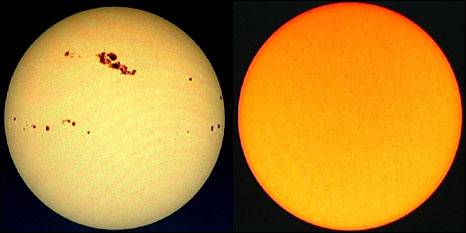DavidS
Anti-Tea Party Member
BBC NEWS | Science & Environment | 'Quiet Sun' baffling astronomers
he Sun is the dimmest it has been for nearly a century.
There are no sunspots, very few solar flares - and our nearest star is the quietest it has been for a very long time.
The observations are baffling astronomers, who are due to study new pictures of the Sun, taken from space, at the UK National Astronomy Meeting.
The Sun normally undergoes an 11-year cycle of activity. At its peak, it has a tumultuous boiling atmosphere that spits out flares and planet-sized chunks of super-hot gas. This is followed by a calmer period.
Last year, it was expected that it would have been hotting up after a quiet spell. But instead it hit a 50-year low in solar wind pressure, a 55-year low in radio emissions, and a 100-year low in sunspot activity.
According to Prof Louise Hara of University College London, it is unclear why this is happening or when the Sun is likely to become more active again.
"There's no sign of us coming out of it yet," she told BBC News.
"At the moment, there are scientific papers coming out suggesting that we'll be going into a normal period of activity soon.
"Others are suggesting we'll be going into another minimum period - this is a big scientific debate at the moment."
 Sunspots could be seen by the Soho telescope in 2001 (l), but not this year (r)
Sunspots could be seen by the Soho telescope in 2001 (l), but not this year (r)
In the mid-17th Century, a quiet spell - known as the Maunder Minimum - lasted 70 years, and led to a "mini ice age".
he Sun is the dimmest it has been for nearly a century.
There are no sunspots, very few solar flares - and our nearest star is the quietest it has been for a very long time.
The observations are baffling astronomers, who are due to study new pictures of the Sun, taken from space, at the UK National Astronomy Meeting.
The Sun normally undergoes an 11-year cycle of activity. At its peak, it has a tumultuous boiling atmosphere that spits out flares and planet-sized chunks of super-hot gas. This is followed by a calmer period.
Last year, it was expected that it would have been hotting up after a quiet spell. But instead it hit a 50-year low in solar wind pressure, a 55-year low in radio emissions, and a 100-year low in sunspot activity.
According to Prof Louise Hara of University College London, it is unclear why this is happening or when the Sun is likely to become more active again.
"There's no sign of us coming out of it yet," she told BBC News.
"At the moment, there are scientific papers coming out suggesting that we'll be going into a normal period of activity soon.
"Others are suggesting we'll be going into another minimum period - this is a big scientific debate at the moment."

In the mid-17th Century, a quiet spell - known as the Maunder Minimum - lasted 70 years, and led to a "mini ice age".
